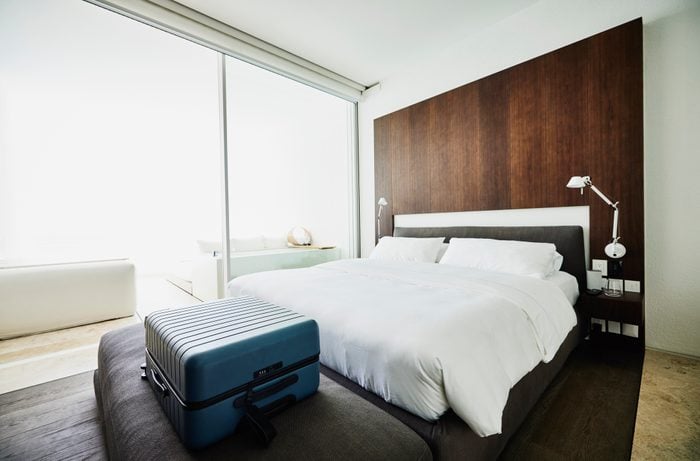
A hotel stay done the right way
Staying in a hotel is one of the great joys of travel: It puts you near the action and, best of all, lets you live it up without ever having to make your own bed or wash your own towels. But while we’re probably all guilty of letting our guard down and cutting loose a little too much on vacation (um, spring break memories, anyone?), staying in a hotel or motel means following some basic rules of etiquette, hygiene and common sense.
After all, even though you’re a paying guest, you’re still a guest on someone else’s property, much like being a houseguest. So just as you wouldn’t swipe things from a friend’s house, there are rules for what things you can (and can’t) take from a hotel. And make sure your offers to help out are appreciated, unlike these so-called polite habits hotel workers dislike.
Pulling from our own travel experiences and consulting travel professionals, we’ve created this list of things you might be doing at a hotel or all-inclusive resort but really shouldn’t do. In coming up with this list, we found we’ve even been guilty of a few—though we’ve never stolen a bathrobe!
Get Reader’s Digest’s Read Up newsletter for more travel, humor, cleaning, tech and fun facts all week long.
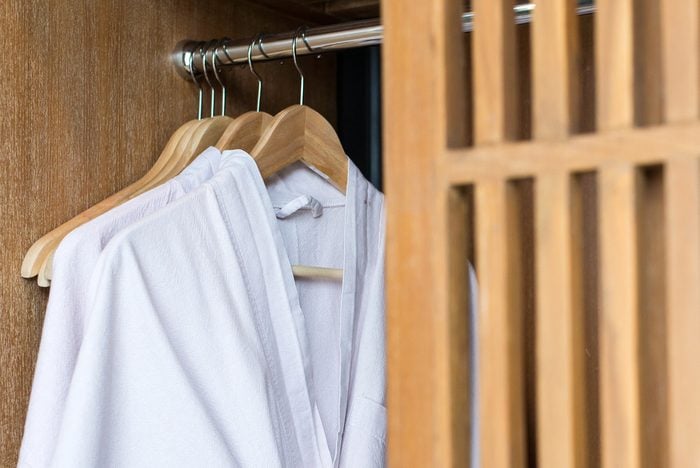
Stealing the bathrobes
There’s no point trying to sneak out with an extra bathrobe in your suitcase, no matter how soft and fluffy it might be. Apart from it being straight-up theft, taking a hotel bathroom home can land you with an unwanted charge on your account. “I usually take the little bottles of lotion in the bathroom or maybe a pen but don’t take anything larger than that,” says travel writer and hotel expert Laura Itzkowitz. “People try to steal all kinds of things from hotel rooms, but these days, there’s a 99% chance they have your credit card info, so they can just charge it back to you.”
The same goes for towels, artwork, electronics and other whatnots. If you’re unsure whether you’re allowed to take a given item, leave it in the hotel. (And while we’re on the topic: Wearing the bathrobe out and about—say, to the pool or spa—is also a rude hotel habit.)
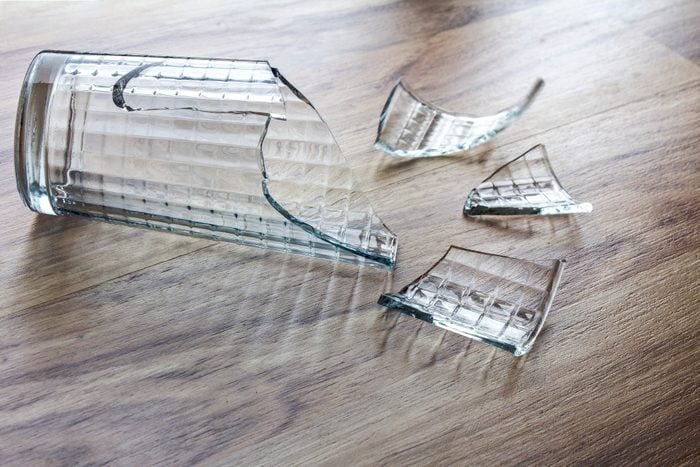
Breaking something and lying about it
Accidents happen, but damaging something in your room and keeping it a secret isn’t just an etiquette mistake; it’s a potential hazard for staff or future guests. So if you break a glass, for example, pick up the pieces and tell the housekeeping staff about it so they can do a thorough check for anything you might have missed. Should something pricier break, like a TV or tablet, report it to the front desk, even if that means you risk being charged for the item. This is a good reason to do a thorough room inspection when you check in. Notice something is broken before you even unpack your suitcase? Immediately report any problems. Next, read what red flags to watch out for to avoid staying at a bad hotel.
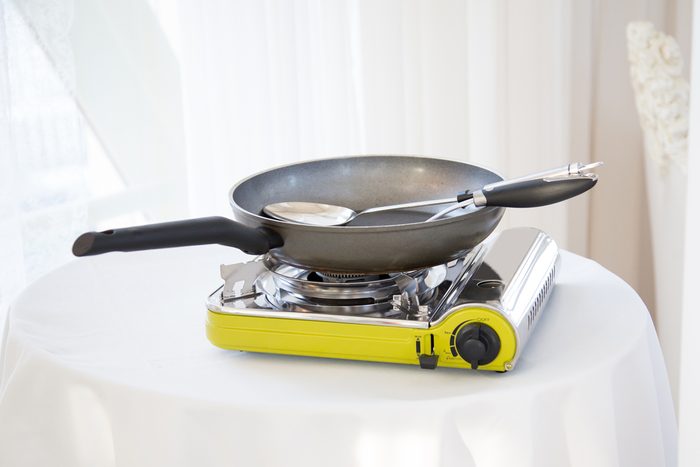
Cooking without a proper kitchen area
“Don’t follow those crazy Instagram or TikTok stories that suggest you use the kettle to cook ramen or the iron to toast a sandwich!” says luxury travel consultant Rebecca Winke. “You’ll ruin the hotel’s appliances, and you’ll get charged—and you also create a major fire hazard.”
We get that you might want to save money, but unless your room has a kitchen or kitchenette, it’s better to make it a cold sandwich or grab some takeout ramen—already cooked!
And forget about bringing your own cooking appliances with you. Hot pots and other cooking gadgets are not conducive to a safe and enjoyable hotel stay, for you or the other guests. Cooking appliances can stink up the room, set off the hotel’s fire alarm system or cause an actual fire.
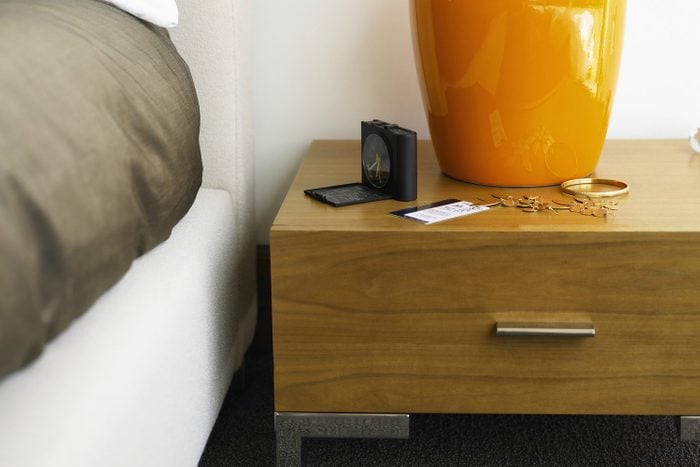
Leaving important jewelry in your suitcase or dresser
Most hotels and hotel rooms are totally safe. It’s rare for someone to enter another person’s hotel room undetected, and rarer still for hotel staff to steal from a guest’s room. But it does happen, and it can really shake up your vacation. Don’t tempt fate by leaving valuables such as jewelry or cash in your suitcase or dresser. If you can’t leave expensive jewelry at home or you need to travel with a large amount of cash, keep it in your in-room safe.
In the unfortunate event that you do experience a theft, report it to both hotel management and your homeowners insurance company, which may provide coverage for your belongings while you are traveling.
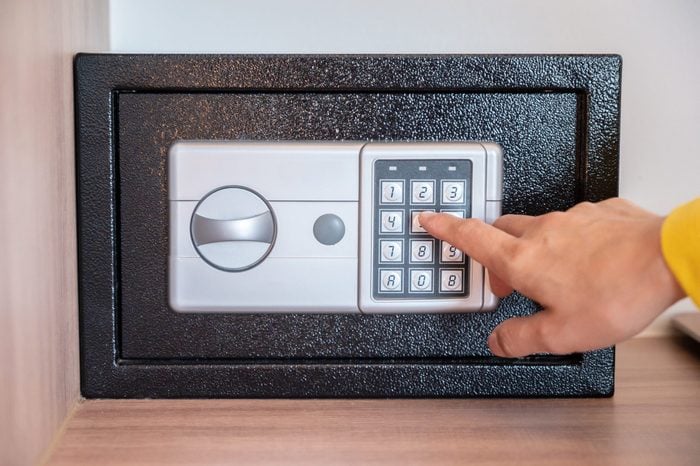
Forgetting to put a shoe in the in-room safe
This one sounds weird, but hear us out. Many travelers avoid the in-room safe because they’re afraid of forgetting the items they left in there and getting halfway home (or to passport control at the airport) only to realize they’ve left important items behind. The answer is to put a shoe in the safe with your pricey belongings—but just one shoe! When you go to pack, you’ll realize that you’re missing a single shoe and remember that it and your other, harder-to-replace items are in the safe.
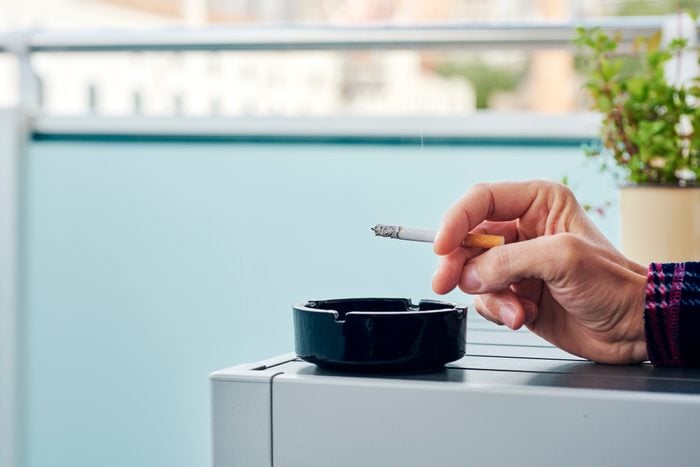
Smoking anywhere (or anything) in a nonsmoking room
Nonsmoking rooms are not for smoking, period. A friend once found this out the hard way when she smoked a cigarette on the balcony of a nonsmoking room and received a $250 fine. Trying to get around the rules by airing out the room or, worse, covering up the smoke alarm never works. And in the case of tampering with the smoke alarm, it’s downright dangerous.
If you can’t book a room in which smoking is permitted, follow the hotel rules and smoke outside in the designated areas. The same goes for vaping and smoking e-cigarettes, which can set off smoke alarms. And as far as weed goes? Legal or not, smoking it in any form in a nonsmoking room is a big no-no.
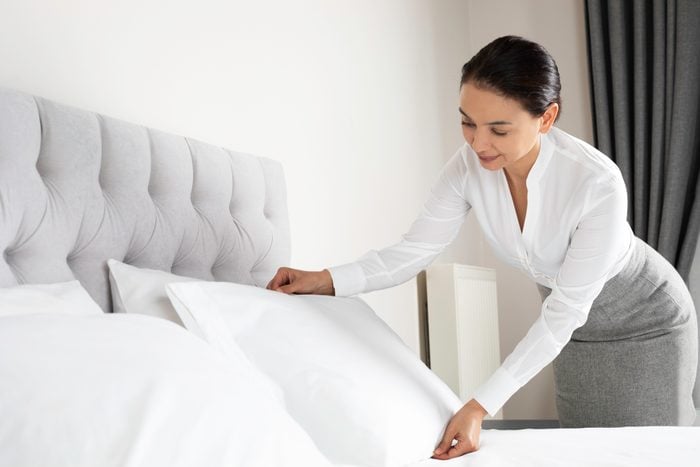
Forgetting to inspect the bed
Even the finest hotels and housekeepers can’t keep creepy critters from making their way into bedrooms. “I always advise travelers to put their luggage in the bathtub until they inspect the bed for bedbugs,” says Mitch Krayton of Krayton Travel. Pull back the bedding and inspect the corners and edges of the mattress. If you find any creepy-crawlies, take a few photos of them, report your findings to management right away and insist on being moved to a different room—which you’ll also need to inspect with an eagle eye.

Using the throw pillows
Those throw pillows may look cozy, but think twice before you rest your head—or any other body part—on them. “If you notice the throw pillows on the bed or the couch have no removable sleeves, you can be sure they are [not normally] thoroughly cleaned,” says Kashlee Kucheran, a seasoned traveler and the co-owner of Travel Off Path. “After they get so stained or smelly that they become offensive, the hotel will just replace them. In the meantime, you can bet there have been many faces, bottoms and other things lounging on those pillows, so steer clear!”
In the wake of the COVID-19 pandemic, many hotels have removed extraneous items from rooms to help prevent the spread of germs. But throw pillows and other textiles remain some of the dirtiest spots in hotel rooms. We feel the same way about fabric-covered headboards—attractive, but hard to clean, and who knows how many heads have rested against them.
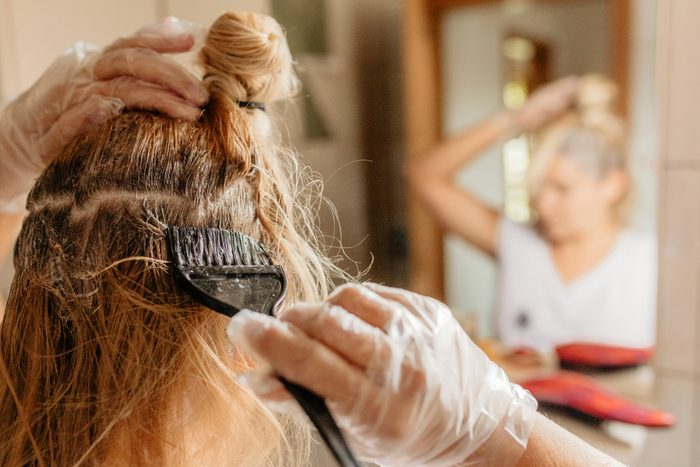
Dyeing your hair
No matter how badly you need a retouch for that special event, dyeing your hair in a hotel room is a recipe for disaster. It’s almost impossible to avoid staining a towel or bathrobe, and that hair color won’t wash out. Worse, you may receive an extra fee.
A better idea? Ask the hotel to book you an appointment at a local salon. (And make sure you’re aware of these seemingly polite habits hairdressers dislike.) Then take care with your recently dyed hair: Avoid washing it at the hotel, or bring your own towel to wrap around your hair until it dries. You may even want to bring your own pillowcase in case the dye rubs off overnight.

Cheating the minibar
Many hotels are doing away with minibars altogether. But if yours still stocks those pricey little bottles of booze and $12 cashews, know this: The house always wins. If you try to cheat the minibar—say, by filling an empty vodka bottle with water (yes, people have done that!)—eventually, you’ll get caught and charged.
The same applies to last-minute minibar raids. If you take an item (like a can of soda) out of the fridge right before checkout, housekeeping will eventually notice the missing item, and it will get added to your final bill. Be careful, too, about non-refrigerated items like salty snacks or chocolates. Unless otherwise specified, they’re almost never free.
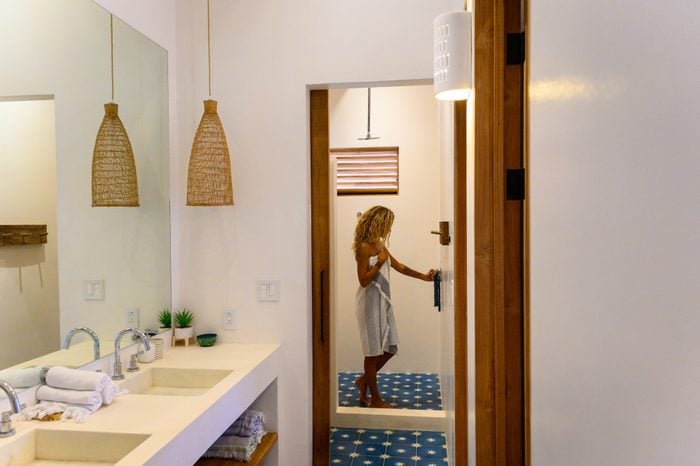
Keeping the bathroom door ajar when taking a shower
There’s nothing wrong with enjoying a steamy shower at a hotel, but beware of what the vapor can do if released into your room. The steam might be dense enough to trigger the room’s fire alarm. Another good reason to keep the door shut? Housekeeping may knock while you’re showering and assume the room is empty when you don’t answer. A closed bathroom door ensures there are no embarrassing encounters for anyone!
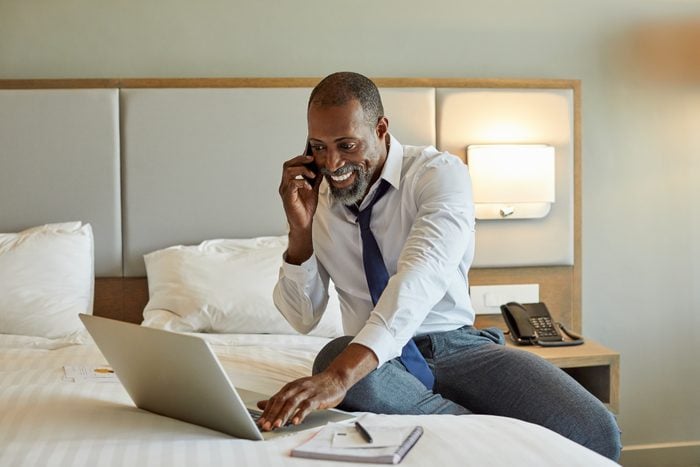
Sending sensitive information over hotel Wi-Fi
Free in-room Wi-Fi is pretty much a standard amenity at most hotels. But you should still exercise caution when using your personal computer in your room. “No one should ever, ever send any sensitive information or conduct any important business over hotel Wi-Fi—at least not without encryption,” says Harold Li, vice president of ExpressVPN. “Given how easy it is to hack public Wi-Fi hot spots, you might as well be yelling your passwords and bank details down the hall.”
Smart travelers use encryption to shield their internet activity when sending important information. So before your next hotel stay, learn how a VPN can keep you safe.
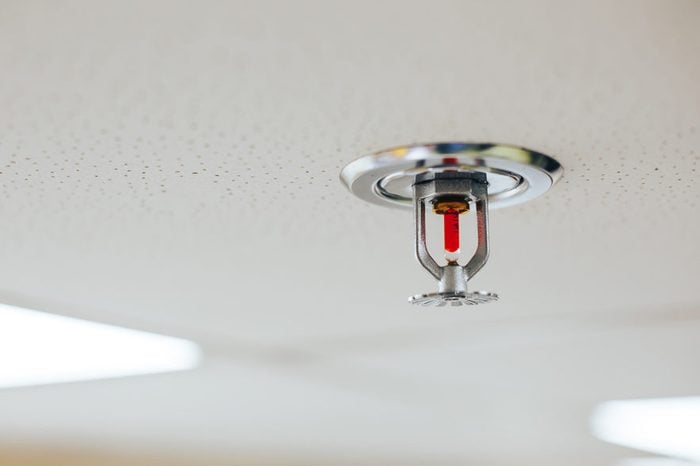
Using the fire sprinkler as a coat hanger
Closets are great for hanging clothes—the sprinklers on your hotel room’s ceiling are not. Frequent traveler Bob Tupper, co-author of Drinking In the Culture: Tuppers’ Guide to Exploring Great Beers in Europe, says he’s seen people using the safety devices as coat hooks, a silly stunt that could not only set off a hotel’s fire alarm but also burst the pipes and cause water to flood into the rooms. That’s a costly amount of damage, all because you needed an extra place to hang up clothes.
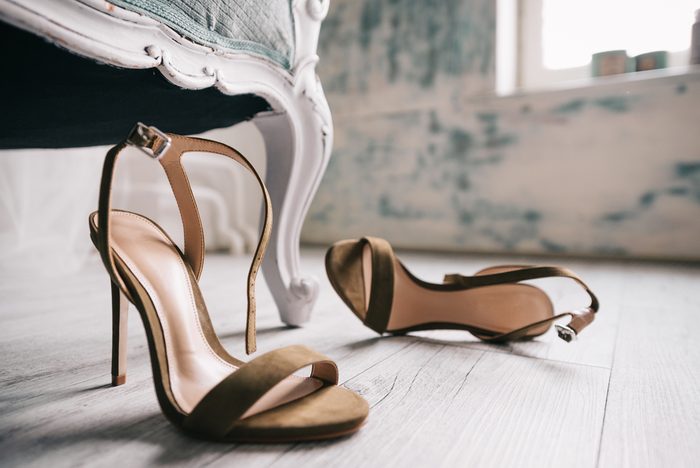
Stomping around
Staying in a hotel is a lot like living in an apartment. You have neighbors all around you, and the walls and floors may be thin. Loud music and voices aren’t the only things you should keep in check when you’re in a hotel room. “In my experience, no matter how luxurious a hotel is, they are still built with materials that don’t allow a lot of soundproofing, especially from upstairs guests,” says Kucheran. Avoid walking around with weighty steps so you don’t become “that annoying guest.” If the hotel has uncarpeted floors, take off your high-heeled shoes or heavy boots before walking to and fro.

Sneaking in your pets
It’s tempting to bring your furry friends on trips with you, but don’t do it unless you’re staying at a pet-friendly hotel. If you’ve asked about the hotel’s policy and learned it caters only to human guests, don’t try to pull a fast one on the staff. Animals leave trails of evidence, from hairs to paw prints to smells, and your cleaning fees will skyrocket if you’ve broken the rules. Besides, it’s disrespectful to the housekeeping staff, which is already working hard to keep the rooms safe and sanitary. And even if the hotel does allow pets, it probably charges an additional fee, so you have to own up to your four-legged friends.
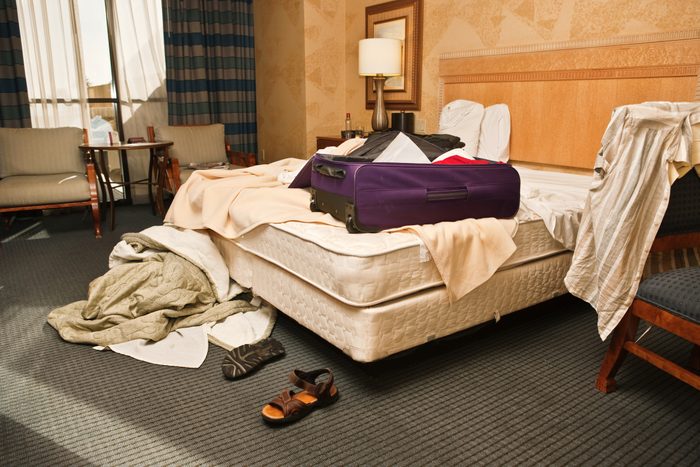
Making a huge mess
Having someone else make the bed and tidy the room is a luxury of a hotel stay. But don’t wear out your welcome by making a huge mess in the room. “Try to be considerate of the housekeeping staff,” says Itzkowitz. “They’re the most invisible staff members, they earn the least and they sometimes have a limited amount of time to clean a large number of rooms.”
If you’ve ordered room service or done some partying in the room, at least make an orderly gathering of your dinnerware and empties. And don’t leave dirty clothes strewn all over the place.
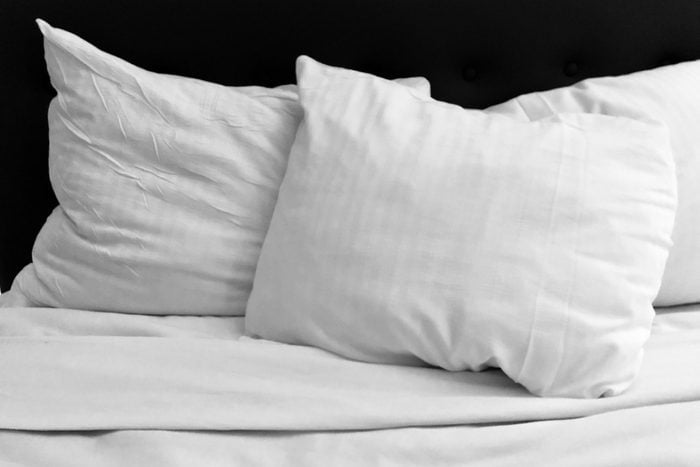
Waiting until you go to bed to check the pillows
Right after you’ve checked your bed for bedbugs and given the all-clear, test the pillows you’ll be sleeping on. Winke says it’s one of the first things you should do in your hotel room. “If you are pillow picky,” she says, “check them immediately and have the front desk bring you more/alternatives during the day when the hotel is still fully staffed and can take care of requests like that quickly.” Smaller hotels may have a lone staffer working the night shift at the front desk, and it might be hard for them to get to your request before you hit the sack.
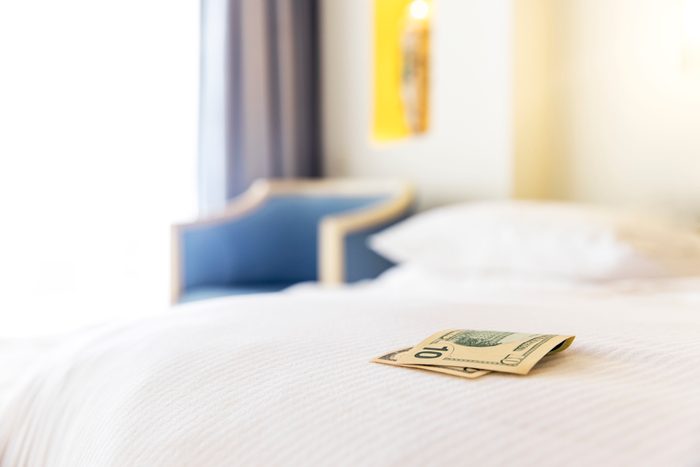
Not leaving a daily tip for housekeeping
First things first: You should be leaving in-room tips for hotel housekeeping staff. Second thing: You should be leaving a daily tip, rather than a cumulative one when you check out. Housekeepers work in shifts, and whoever cleaned your room on Tuesday might not be the same person cleaning it on Wednesday. The fairest approach is to leave a daily tip of at least $3 to $5. That day’s housekeeper can pocket the tip, and no one gets cheated.

Having a little too much “fun”
We get it. Hotel rooms are great environments for a little friskiness, especially if you’re on a romantic getaway. But just like you shouldn’t stomp loudly on the floor, you shouldn’t do other things loudly in your hotel room either. Why risk the embarrassing side-eye at the breakfast buffet? Tone down the volume during romantic rendezvous.
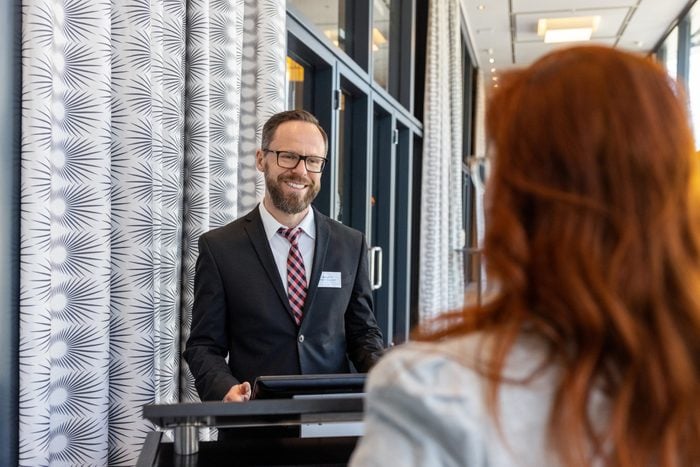
Not cutting everyone a little slack
Travel is more stressful than ever. Airlines, restaurants, hotels, all-inclusive resorts and retail outlets are experiencing staffing shortages, and travelers often bear the brunt of this understaffing. The person helping you may be a new trainee or may be overworked, and the hotel may be shorthanded. Whatever hiccups may occur in service or your special requests, they’re seldom the fault of a single person. Now’s the time to be a gentler traveler: Be a little more patient and a little less demanding.
Additional reporting by Noelia Trujillo.
Sources:
- Laura Itzkowitz, travel writer and hotel expert
- Rebecca Winke, luxury travel consultant
- Mitch Krayton, Krayton Travel
- Kashlee Kucheran, seasoned traveler and co-owner of Travel Off Path
- Harold Li, vice president of ExpressVPN
- Bob Tupper, co-author of Drinking In the Culture: Tuppers’ Guide to Exploring Great Beers in Europe